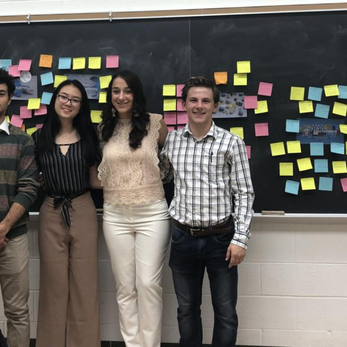top of page
ERICA MI
P: +1 (814) 308 - 3937

Hello! I am Erica Mi, a first-year NSF CISE CSGrad4US Fellow and Ph.D. student in Computer Science at the University of Chicago, advised by Mina Lee. My research interests focus on human-computer interaction of social and organizational informatics. I look to combine social sciences with computational and participatory methods to analyze social phenomena and influence AI ethics and policy, impacting the design thinking across technology, business, and society.
I received my M.S. in Informatics from the College of Information Sciences and Technology at Penn State University advised by Fred Fonseca, where I explored the degree extended reality experience could generate presence, enough to rival real-world experiences, to understand the ethical implications of immersive technology.
Prior to my Master's degree, I received a B.S. in Information Sciences and Technology (Integration and Application) and B.A. in Telecommunications through the Schreyer Honors College at Penn State at Penn State.
Awards
Work Experience
Aug
2024
NSF CISE CSGrad4US Fellowship
Dec
2022
College of Information Sciences and Technology Student Marshal, Penn State
Sep
2022
CMD-IT/ACM Richard Tapia Conference, Penn State
Jul
2022
KPMG Ideation Challenge (KIC) Nationals; Copenhagen, Denmark
Mar
2022
Education Abroad Back to the World Scholarship; Athens, Greece; Pforzheim, Germany
Jun
2021
Honora and William Jaffe Scholarship, Penn State
Mar
2021
John Sr. and Kimlyn Patishnock Undergraduate Research Award, Penn State Libraries
Oct
2020
Grace Hopper Conference, Penn State
Oct
2020
Nittany AI Challenge 2020 Finalist
Sep
2020
Spark Fellow, Penn State
Sep
2020
Student Engagement Network Remote Innovation Grant, Penn State
Sep
2019
Schreyer Honors College (SHC) Academic Excellence Scholarship, Penn State
Academic Works




Danica E. White, Erica Mi
Council on Undergraduate Research's ConnectUR Annual Conference
Undergraduate research offers a significant avenue for enhancing the engagement and skill development of underrepresented students, particularly those from BIPOC backgrounds. This study conducted at Penn State University aimed to illuminate the challenges faced by BIPOC students in their pursuit of undergraduate research opportunities and promote diversity and inclusivity within research programs. Through interviews and surveys, the research team discovered that students often grapple with uncertainty when seeking research prospects, with disparities in access to information. They also highlighted the importance of faculty mentorship, particularly from individuals with shared backgrounds. Although opinions on the influence of race or ethnicity on research experiences varied, the study emphasized the need for tailored support and proactive outreach efforts to improve the accessibility of undergraduate research resources.
[ 1 ]
Danica E. White, Erica Mi. 2023. “Examining BIPOC Student Barriers in Undergraduate Research.” Scholarship and Practice of Undergraduate Research 7 (2): 35-38.
Erica Mi; Advised by Dr. Fred Fonseca
The issue of understanding the extent to which an extended reality experience can create an immersive flow that syncs with the user’s sense of presence, enough to rival real-world experiences, remains open to research. Current studies focus on using extended reality for simulation-based memory recall or episodic memory use. However, an area that is lacking is the understanding of how these immersive experiences can connect back to personal memories. In this study, former college students who were new to extended reality participated in a 360-degree video virtual experience. The ability to recall stories from their college days reflects the effectiveness of extended reality to relieve hiraeth—the longing for a home that is no longer present for them. By testing immersion through 360-degree videos, the potential to recreate a space that is no longer part of their current reality, but holds a personal anecdote, allows for the future creation of virtual memory capsules. The challenge is the ability to rekindle the user’s state of mind that was once associated with the location, ultimately providing relief for those who feel a sense of hiraeth.
[ 2 ]
Erica Mi. “Immersive Reality Capabilities of Relieving Hiraeth.” Penn State University Master Thesis. Dec 2022. Under Review by JASIST.
Erica Mi; Advised by Dr. Guoray Cai
John Sr. and Kimlyn Patishnock Undergraduate Research Award: Excellence in Information Literacy
Since the rise in severity of the pandemic, the World Health Organization (WHO) and the Center for Disease Control and Prevention (CDC) have faced medical device and supply shortages to accommodate patients in urgent care due to COVID-19. The United States has prioritized the effective distribution of supplies to high-risk areas. This research dives into data visualization design concepts behind self-generated Tableau dashboards to support decision points and reduce ambiguity.
[ 3 ]
Yue You; Advised by Dr. Xinning Gui
2020 Undergraduate Research Support
Conducted 11 semi-structured interviews and used coding through Dedoose for feature analysis to support Ph.D. candidate, Yue You's, research on user experience with AI-enabled chatbot-based symptom checker (CSC) applications. Support and thesis review recognized in "Acknowledgements" section.
-
-
Work Experiences
Oct 2023 - Oct 2025
Mar 2023 - Sep 2023
Jun 2022 - Aug 2022
May 2021 - Aug 2021
Jun 2020 - Aug 2020
EY-Parthenon
Associate
New York, NY
MIT Lincoln Laboratory
Cybersecurity Operations Research Intern (Group 57)
Lexington, MA
EY-Parthenon
Summer Associate
New York, NY
IBM
Project Manager Intern
Durham, NC
Johnson & Johnson
Data Analytics Intern
Raritan, NJ
News
Work Experiences
bottom of page







